
Italy’s Immigration Rubik’s Cube
Much of Italy and the Italians are amazing—but relocating to Italy it’s also like solving a Rubik’s Cube with four sides. Our favorite Italian saying which we heard on the first time we approached the Agenzia Entrate is "La burocrazia è spaventosa."
Instead of colors from the Rubrik's Cube, the puzzle pieces are:
🟢 Residency & Status
🔵 Healthcare
🟡 Driving
🔴 Income & Taxes
The twist? Every move you make on one side affects the others.
🟢 Residency & Status
You can rent or even buy property in Italy without residency.
Stays under 90 days don’t require it.
But—residency is the key that unlocks healthcare, driving privileges, being able to buy a car, and tax changes. You have eight days to pick up a Permesso di Soggiorno package at the Poste Italiane and start the process.
🔵 Healthcare
No residency = no enrollment in Italy’s national healthcare system.
With residency, you gain access to local doctors, hospitals, and low-cost prescriptions.
🟡 Driving
Visitors can use an international driving permit without issues.
Visitors can't buy or register a vehicle.
Once you’re a resident, your U.S. license is valid for only one year.
Since Italy has no agreement with the U.S., you’ll need to pass the Italian driving test.
🔴 Income & Taxes
As a visitor, your taxes stay tied to your home country.
Once resident, Italy may tax your worldwide income—a major change many expats overlook.
Putting It Together. Each decision—residency, healthcare, driving, or taxes—reshapes the others. Think of it as an interconnected puzzle. Understanding the rules before making a move helps avoid frustration, delays, and unexpected costs. Read on to learn more.

Smooth Transition Ahead
Essential information for expats to navigate and embrace the Italian way of life effortlessly.
When Americans retire or separate from the military and intend to stay in Italy, they must apply for a Permesso di Soggiorno (Residence Permit) to legally remain in the country. Here’s an overview of the process and key details:
Timeline and Deadlines
Application Window: You must apply for the Permesso di Soggiorno within 8 days of entering into Italy or after military separation or retirement.
Transition Status: If you already hold a SOFA card (orders), it will no longer be valid after separation or retirement. You must transition to a civilian residency permit.
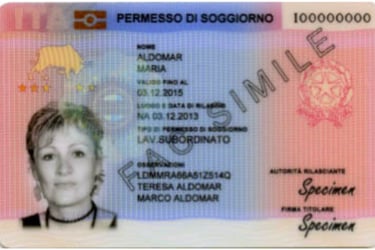

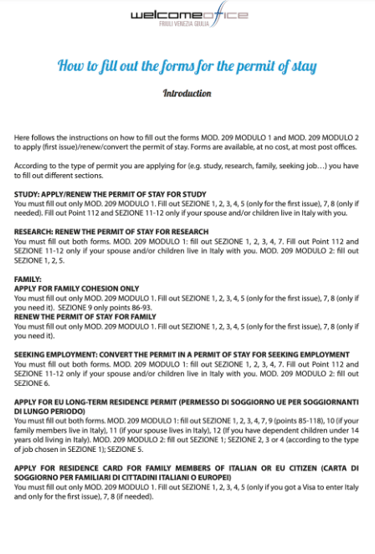

Permesso di Soggiorno and Italian Residency
Steps to Apply for a Permesso di Soggiorno
Gather Required Documents:
Passport (valid for at least six months beyond the application date).
Proof of financial means (e.g., bank statements, pension documents).
Proof of health insurance (private or Italian-based).
Proof of residence in Italy (a rental agreement or proof of property ownership).
A completed application form for the Permesso di Soggiorno (available at the post office).
Visit Poste Italiane:
Go to a post office with a Sportello Amico to obtain the Permesso di Soggiorno Kit (application packet).
Complete the forms and submit the packet at the post office.
Include a payment for the application fee (approximately €76-€136, depending on the type and length of the permit).
Save all the documents provided! Your appointment may be in six months or more and you will need these documents.
Receive an Appointment:
Upon submitting your application, you will receive a receipt with a tracking number and an appointment date for biometric data collection at the Questura (police headquarters).
Attend the Questura Appointment:
Bring all original documents, your passport, and the receipt.
Provide fingerprints and any additional information required.
Wait for Processing:
Processing times can vary but typically take 1-3 months. During this time, the receipt serves as proof of your legal status in Italy. To check on the status of the Permesso di Soggiorno, see the link below.
Residency and Its Role
Establishing residency means being officially registered in the Italian community where you live. Residency is a legal requirement for non-SOFA Americans living in Italy long-term, such as retirees or dependents who stay after a sponsor’s assignment ends.
Before Applying for the Permesso: You must establish residency in an Italian municipality. This involves registering your address with the local Comune (municipal office) via the Anagrafe (Registry Office). Proof of residency is critical for the Permesso di Soggiorno application.
Residency Verification: Local police may visit your registered address to confirm your residence.
Tax Considerations: Residency may trigger obligations for local taxes, particularly if you own property or conduct business in Italy or obigate you to paying taxes in the future.
Additional Considerations
You must secure private health insurance or enroll in the Italian National Health Service (SSN).
Assistance: For assistance with the Permesso di Soggiorno application or renewal, Americans, expats, and ex-military should seek out a Patronato office, which are free service centers often affiliated with major Italian unions like CISL. These offices specialize in social security and immigration services, providing expert guidance through the complex paperwork. For military retirees, consult the Base Legal Office or a local immigration advisor if you are unsure about specific steps or documentation..
Italian Driver's License Process
If it's not possible to obtain an Italian Driver's License through a agreement who has a bilateral agreement or military installation, then here is the process for obtaining an Italian Driver's license.
General Requirements:
Italian Law: All residents of Italy are required to drive with an Italian driver’s license after one year of residency. An American license alone is not valid beyond that point.
Driver’s License Exchange: Unfortunately, Italy and the U.S. do not have a license reciprocity agreement. Thus, Americans who don't have a valid driver's license from a nation that has a bilateral agreement with Italy must go through the full process to obtain an Italian driver's license.
Step 1: Enroll in a Driving School (Autoscuola)
Most Americans opt to go through a driving school because the process can be complex, especially the written test in Italian.
Some schools offer assistance in English or provide bilingual materials.
Step 2: Pass the Written Test (Theory Exam)
The theory test is mandatory for all applicants, regardless of prior experience.
It consists of 40 multiple-choice questions on Italian traffic laws, road signs, and driving etiquette.
Passing Score: At least 36 correct answers (maximum of 4 mistakes).
Language: The test is typically in Italian, though some regions may offer an English version. Check in your area if there are any offering in English.
Preparation: Driving schools provide study materials and mock tests.
Step 3: Obtain a Learner’s Permit (Foglio Rosa)
After passing the theory test, you receive a learner’s permit, valid for 6 months. This allows you to practice driving with a licensed instructor or a driver over 10 years of experience.
Step 4: Pass the Practical Driving Test
The practical exam is taken in a manual or automatic car (though licenses for automatic cars restrict you from driving manual vehicles).
The test evaluates:
Basic vehicle control.
Adherence to traffic laws.
Ability to navigate various road scenarios.
Costs and Timeframe
Cost: The total cost can range from €700 to €1,000+, covering driving school fees, exams, and required medical certifications.
Timeframe: The process typically takes 3–6 months, depending on how quickly you pass the exams.
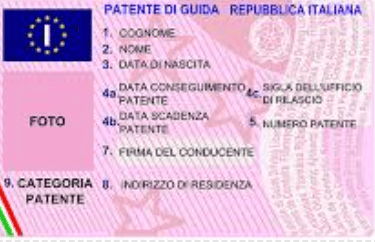






U.S.-Italy Tax Agreement
Navigating taxes as an expatriate or international resident can feel overwhelming, especially when balancing obligations between two countries.
To simplify, the United States and Italy have established a bilateral agreement titled "The Convention Between the Government of the United States of America and the Government of the Italian Republic for the Avoidance of Double Taxation with Respect to Taxes on Income."
This treaty aims to prevent double taxation by clarifying how income is taxed when earned in one country and reported in another. It provides a framework for allocating taxing rights, reducing tax burdens, and fostering economic cooperation between the two nations.
The treaty does not exempt individuals from filing requirements or tax obligations. Instead, it outlines specific rules and credits designed to ensure fairness and avoid overpayment.
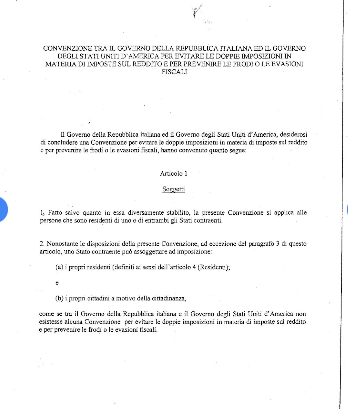

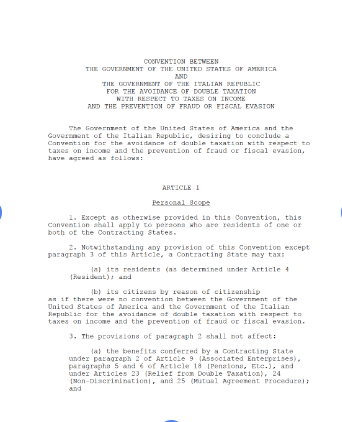

Tax Disclaimer:Tax laws, residency status, and income reporting requirements are governed by both Italian and U.S. law. These regulations can vary widely depending on individual circumstances.
Questions about your specific tax obligations should always be directed to experienced income tax advisers or commercialisti familiar with international tax treaties and compliance. For more information, consult your tax professional, and explore how this treaty may apply to your unique situation.
FVG Discount Gas Card
The Carta Carburanti Friuli Venezia Giulia (FVG) is a fuel discount card available to residents of Friuli Venezia Giulia, designed to offset the region's proximity to neighboring countries with lower fuel prices.
To qualify, residents must have their primary residence in the region, own or lease a vehicle registered in Italy, and hold a valid Italian residency permit. The card provides a significant discount on fuel prices at participating gas stations, with savings varying based on the type of fuel and current market conditions.


The program aims to support local residents by reducing the financial burden of fuel costs, making it easier to travel within and beyond the region. The discount depends on your place of residency, but ranges from €0.17 per liter to €0.24 per liter discount.

Italian Home Buying: Do You Really Need a Realtor?
Buying a home in Italy is an exciting opportunity, but it comes with unique challenges that differ from other countries. Speaking from experience of buying and selling twice without a realtor, having one can save a great deal in money and headaches. While hiring a real estate agent (agente immobiliare) isn’t mandatory, it can be a game-changer if you’re not fluent in Italian, unfamiliar with the complex legal process, or need help navigating financing and local regulations.
Key figures like the notaio (notary), the ufficio catastale (land registry office), and other bureaucratic steps can make the process overwhelming for foreign buyers. If you’re confident in handling these aspects yourself, you may not need an agent. However, for most buyers—especially those unfamiliar with the regional market, negotiation customs, and property laws—a knowledgeable realtor is worth every euro.
Before meeting with an Italian real estate agent, take time to reflect on what you truly need. Answering these 10 essential questions will help you clarify your priorities, streamline your home search, and ensure you’re making an informed decision before committing to a purchase.
10 Questions to Ask Yourself before Meeting with an Italian Realtor
1. What type of house or condominium are you looking for, new, existing, or fixer-upper? Understanding your preferences for the type of property you are interested in helps your realtor narrow down the search and present suitable options. Discuss your desired features, such as the size, style, number of bedrooms, and any specific amenities you prefer.
2. Where would you like to live, rural or urban, near the mountains or beach? Italy offers diverse landscapes, from picturesque countryside settings to vibrant urban areas, coastal regions, and mountainous regions. Clarify your desired location, considering factors like proximity to amenities, natural surroundings, transportation links, and lifestyle preferences.
3. When are you looking to purchase, and are you aware of how much time it takes to purchase a home in Italy? The home-buying process in Italy can take longer compared to some other countries due to legal and bureaucratic procedures. Discuss your timeline with the Realtor and have realistic expectations regarding the duration of the process, including finding a property, negotiation, due diligence, and legal procedures.
4. Will you require financing, and how familiar are you with deposit requirements and Italian financing options? Determine if you need financing and familiarize yourself with the deposit requirements and available financing options in Italy. Typically, a 10% deposit is common, and mortgages may cover up to 80% of the property value. Additionally, consider other costs like taxes, realtor fees, notary fees, and registration fees, which may amount to around 25% of the home cost.
5. What is your status, and why does it matter? Understanding your legal and residency status is important as it can impact taxes, fees, and eligibility for certain benefits. For instance, first-time homebuyers who have residency may qualify for a reduced 4% IVA (VAT) rate on their purchase.
Is this the right realtor for me?
Availability and Responsiveness
A good realtor understands that relocation and house hunting often happen on tight timelines. See if they respond to emails promptly—even on weekends or after hours—especially during the early stages of your search when questions and decisions are frequent.Meet Them in Person at Their Office
Visiting a realtor’s office is not only professional courtesy—it also gives you insight into their business, staff, and work environment. An organized, welcoming office often reflects their overall professionalism.Ask for Recommendations
Don’t hesitate to ask locals, expats, or other professionals (such as lawyers or relocation consultants) who they would recommend. A strong word-of-mouth reputation in the community is one of the best indicators of trustworthiness and service quality.Property Portfolio Fit
Before committing, check if they have properties in their portfolio that match your needs—whether it’s location, budget, style, or amenities. The right realtor will also be honest if they’re not the best fit and may refer you to a colleague who specializes in your desired area.Clear Communication
Look for someone who explains the buying or renting process in clear terms, ideally in English if your Italian is limited. A professional realtor should be transparent about fees, contracts, and any steps you’ll need to take with notaries or local offices.














6. How well do you understand and are you willing to deal with Italian bureaucracy? Italy has a bureaucratic system, and navigating through administrative processes is essential when purchasing a property. Discuss with your Realtor the steps involved, required documentation, and potential challenges to ensure you are prepared for the bureaucracy involved.
7. How well are you familiar with online tools as there is no MLS, and the responsibility of research lies with the buyer? In Italy, there is no centralized Multiple Listing Service (MLS). Buyers often rely on online platforms like www.casa.it and www.immobiliare.it to search for available properties. Familiarize yourself with these tools and be proactive in conducting research and finding potential properties of interest.
8. How well do you know the Italian housing market? Understand the current state of the Italian housing market, including the supply and demand dynamics, average prices, and market trends. Recognize that the inventory of new homes may be relatively limited compared to other countries, and being aware of this can help manage expectations.
9. How familiar are you with the Italian home buying process and terminology? Familiarize yourself with the Italian home buying process and key terminology to better understand the steps involved. In Italy, a preliminary contract (Preliminaria) precedes the final contract (Compravendita), which is conducted by the notary in the presence of the Realtor, buyer, and seller. It's essential to be prepared for these legal procedures and be comfortable with the contracts and documentation, which will be in Italian.
10. How well do you know the role of a realtor? Understand that Realtors in Italy act as mediators representing both parties, the buyer and the seller. They assist in dealing with problems that may arise during the transaction, schedule appointments, and facilitate communication between all parties involved. Recognize the importance of having a realtor who understands your needs and can guide you through the process effectively.
Contact us Directly
rightstartitaly@gmail.com
© 2025. All rights reserved.
Connect
Disclaimer: The content on Right Start Italy is informational and educational purposes only. While every effort is made to ensure accuracy and relevance, the information presented may not reflect the latest developments or specific circumstances. Readers are encouraged to seek professional advice or consult experts in areas such as legal, financial, medical, or other specialized matters before making decisions based on the information provided.
User Responsibility:
By using this website, users acknowledge that they do so at their own risk. Right Start Italy will not be held liable for any losses, damages, or inconveniences arising from the use of this site or reliance on its content.
Copyright Notice:
All content, including text, images, and graphics, is the property of Right Start Italy and Learning unless otherwise credited. Unauthorized use or reproduction is prohibited. For questions or concerns, please contact us via the Connect Section.
